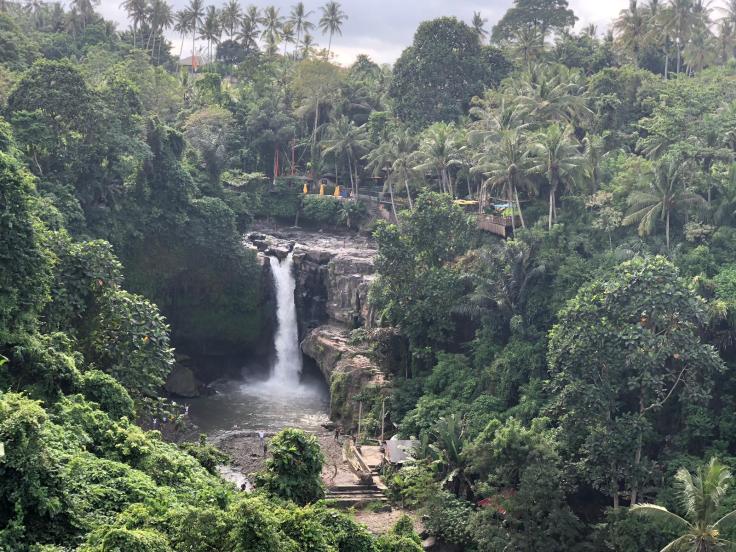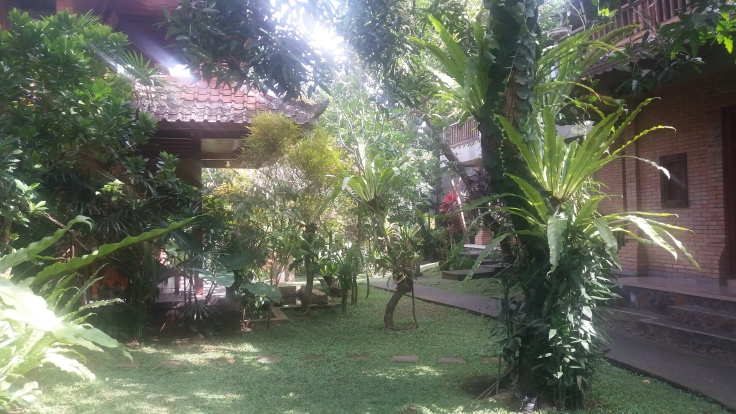
After leaving the Castle in Koh Samui prematurely, I made my way to Bali Indonesia, to indulge in some surf and finally find out what the big Bali-fuss is all about. In the last decade and a half I heard a lot about the ‘magical island’, good and bad. As Bali is another totally hyped-up tourist-travellers’ destination, I came to the island with a ‘well-let’s-just-see’ attitude. However, I quite quickly got in tune with the island’s vibe and totally understand why so many people are raving about Bali.
Treading Beaten Tracks
Those of a certain age, who have been lucky enough to have visited Bali in the last century, will probably lament how the island has changed. Bali was never high up on my must-go list, mainly because it’s so far away from Europe and I prefer the Americas to Asia. As Bali is a true Mekka for both surf and yoga, and I have become some sort of surfing yoga freak in recent years, and considering I was relatively nearby, it is a case of a better-late-than-never must-visit.
Bali Magic for Everyone
Bali is a lot of different things to many different people, which is reflected in the very diverse crowd of visiting as well as residing foreigners. Bali is a surfer’s paradise with great waves all-year-round. It is an exciting digital nomad hub with a big concentration of highly interesting remote working freelancers and business owners. It is a great centre of culture, the arts, yoga and other spiritual pursuits, which attracts many artists, bohemians, hippies and yoginis, both authentic and wannabee. It is a relatively close by and affordable escape for Australians, and many Aussies can be found in the overdeveloped and rather trashy tourist resort of Kuta. Across the island you find conventional tourists and travellers of all ages. You can come across foreigners, who have made Bali their base in the last months, years or decades. And amongst all those visiting and residing foreigners the Balinese hold on to their culture and try to make the most of the tourist influx, just like the many Indonesians from other islands. What most Balinese and other Indonesians have in common is that they are incredibly kind and know how to serve you amazing food. As the island is sustained by tourism, you can come across the nastier side of the sector. Prices are most likely highly inflated in comparison to other islands of the archipelago, and depending on where you are, they try to sell you stuff on every street corner. Yet, if you’ve ever experienced aggressive selling tactics in India or Egypt, then the Balinese approach is absolutely nothing to get worked up about.
The Dark Fairy Experience
After having been based in the more upmarket resort of Seminyak for 10 days, to surf several breaks in southwest Bali, I relocated to Ubud. Ubud is located more inland in a hilly environment and is considered the cultural heart of the island. There you can find a lot of yoga facilities, hippy food cafes and overpriced shops flogging hippy, new-age and/ or bohemian wares. It is not high season yet, but the town is already filled with foreigners. I personally like the vibe, yet the energy in Ubud can be experienced as very dense, which can get on some people’s nerves. A digital nomad rock star friend of mine who lives in Bali, told me that this energy issue might have to do with a lot of spiritual activity and pursuit. A lot of people travel from afar to Bali in an attempt to deal with – or flee from- issues in their lives through yoga, energy healing, cacao ceremonies and other hippy and new-age action. So, there are many people with a fair amount of baggage concentrated in one place. Furthermore, like on the rest of the island, the Balinese are engaged in a lot of spiritual activity bringing offers to ‘the gods’ several times a day at the many- many- temples that are present on the island. Bali also has a strong hedonistic vibe of partying, boozing, pampering and general indulgence. It is very stressful to find illicit intoxicating means, however, as Indonesia has draconian drug laws and you should count yourself lucky if they don’t hang you when they catch you with a few grams of herbs. In Ubud as well as at the beaches of southwest Bali, I had several engaging encounters with entertaining, inspiring and sometimes slightly wacky folk. In terms of prices, like Siargao, if you are coming straight from Europe or another region with western prices, you will find Bali affordable. I can imagine it is a shock to the system coming from other islands or considerably more affordable regions in South East Asia. Hippy food, activity and merchandise tend to be cheaper than at home, but on some occasions they are actually the same price. I am sure this is not an issue for many tourist-travellers on a two-week holiday, but for a lifestyle traveller, costs can easily get out of hand if you spend without awareness, as there is so much to sample and get lost in.

(Dutch) Paradise Lost
If you have visited Bali several or many years ago and you would experience it now, I can imagine that you are of the opinion that paradise is being ruined by more visitors, more development, increasing prices and more mainstream tourism bollocks. During my time in Ubud I also got an understanding of how hard it must have been for the Dutch imperialist to let go of Bali and the other islands that are now Indonesia.
Indonesia plays a significant role in Dutch history and Dutch culture. Indonesian food is what Indian food is to Brits and especially in the city of the Hague there is a large minority of Dutch East Indian descent. These people are called Indos and are of mixed heritage. For more than three centuries the Dutch ruled in what was then called the Dutch East Indies, robbing the region of its natural resources making the Netherlands incredibly rich. For much of this time, the Dutch ruled the region as an apartheid state, however, although it wasn’t encouraged, mixing between Dutch men and local women was very common. I resided at a homestay in the very centre of Ubud. Although the entrance to the large compound, that includes a family temple, is located on one of the town’s main roads, the homestay has a serene and tranquil atmosphere. The compound has several houses, some are for guests and others for the large family of the owner. I was housed in a spacious studio apartment at the very back of the garden with a big terrace overlooking the jungle. While being surrounded by lushness, tranquillity and local family live, I got a sense of how the Dutch colonialist must have felt. Living in tranquil tropical luxury with kind and subservient locals at your back and call. With the exception of complaints about the heat and exotic creepy- crawlies, it must have been like true paradise. The more painful to have ‘lost’ that paradise after Japanese occupation and post-war hostilities and having to ‘return’ to the Netherlands to a no doubt cold reception.
Bali is what you make of it
As a Dutchie of migrant parents I’ve never taken much pride in what are considered the great rewards of Dutch colonial history or could feel much empathy for what the colonisers had been through during and after the Second World War. Every stories has different sides and all people’s suffering is human suffering, regardless of background or whether it could be considered ‘one’s own fault’. Bali might be paradise to some right now, and to others a Balinese paradise was once there but lost 5, 20 or 75 years ago. For me, a first-time visiting, surfing, digital nomadic yogini, who loves great culture, tropical weather and meeting interesting people, this place is the bees’ knees.
Top image: Helena

Leave a comment